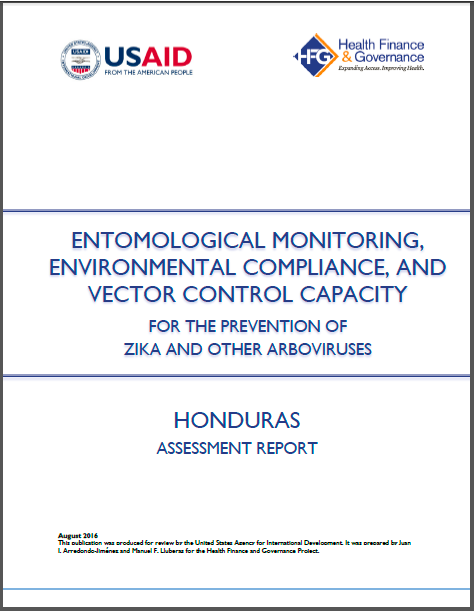Entomological Monitoring, Environmental Compliance, and Vector Control Capacity for the Prevention of Zika and Other Arboviruses: Honduras Assessment Report
Categories: Capacity Building, Health Systems Research, Home Page Map, Publications, Vector-borne Diseases, Where We Work, Zika
Resource Type: Report
Authors: Juan I. Arredondo-Jiménez and Manuel F. Lluberas
Published: 8/1/2016
Resource Description:
 The first case of local, vector-borne transmission of the Zika virus in the Americas was identified in May 2015 in Brazil. By July 2016, the virus had spread to nearly all Zika-suitable transmission zones in the Americas, including the majority of countries and territories in the Latin America and the Caribbean (LAC) region. Governments in the region face a formidable challenge to minimize Zika transmission and limit the impact of Zika on their populations.
The first case of local, vector-borne transmission of the Zika virus in the Americas was identified in May 2015 in Brazil. By July 2016, the virus had spread to nearly all Zika-suitable transmission zones in the Americas, including the majority of countries and territories in the Latin America and the Caribbean (LAC) region. Governments in the region face a formidable challenge to minimize Zika transmission and limit the impact of Zika on their populations.
The United States Agency for International Development (USAID) supports efforts to strengthen the region’s Zika response through targeted technical assistance, stakeholder coordination, and implementation of key interventions. In Honduras, the USAID-funded Health Finance and Governance project assessed country capacity to conduct vector control and entomological monitoring of Aedes mosquitoes, the primary vector of the virus. The assessment was conducted from June 29 to July 8, 2016, and sought to appraise current capacities, identify strengths and weaknesses in these capacities, and recommend countermeasures, i.e., specific strategies to minimize the impact of Zika virus transmission.
After acknowledging the presence of the disease in the country, the Government of Honduras formed a national-level Zika Command Team (ZCT) composed of members of Health Surveillance Units and Health Services Integrated Networks (HSINs), including Environmental Health Technicians (vector surveillance and control), Communications Unit, Promotion Unit, Epidemiology Unit, National Reference Laboratory, and medical providers (under Hospitals and HSIN). The ZCT meets every week to review the latest information available and decide on responses that have national and department application. Thus far, however, focus has been on diagnosis and awareness through activities such as procuring laboratory reagents for diagnosis, epidemiological reporting, and production of communication materials to advise on Zika prevention. Unlike with earlier responses to other arboviral diseases, like dengue and chikungunya, Honduras has not taken any specific measures on vector surveillance and control related to Zika.
The assessment found that the vector control program in Honduras is limited by:
- Inadequate capacity for basic entomological studies to determine biological efficacy of Zika vector control activities.
- Inadequate capacity to maintain and calibrate spray equipment.
- Poor environmental compliance in insecticide/equipment storage facilities.
- Lack of an integrated, online system to manage the data on disease transmission, and vector surveillance and control.
- No quality assurance mechanisms of data systems, chemical and biological intervention methods, and the extent and effectiveness of community-based source reduction projects.
Underlying the capacity issues listed above is inadequate funding, which prevents vector control personnel from fully implementing the operational plans. There is no funding for vehicles, fuel, spray equipment, or PPE. Nor is there funding for laboratory equipment, materials, and reagents needed for entomological monitoring, according to personnel involved with procurement. The US$1.1 million national budget approved for the 2016 response to Zika and other arboviral diseases is insufficient.
Download



